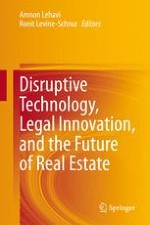2020 | OriginalPaper | Buchkapitel
Blockchain-Based Land Registers: A Law-and-Economics Perspective
verfasst von : Georg von Wangenheim
Erschienen in: Disruptive Technology, Legal Innovation, and the Future of Real Estate
Verlag: Springer International Publishing
Aktivieren Sie unsere intelligente Suche, um passende Fachinhalte oder Patente zu finden.
Wählen Sie Textabschnitte aus um mit Künstlicher Intelligenz passenden Patente zu finden. powered by
Markieren Sie Textabschnitte, um KI-gestützt weitere passende Inhalte zu finden. powered by
